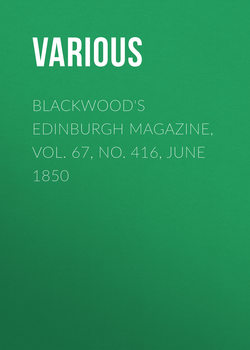Читать книгу Blackwood's Edinburgh Magazine, Vol. 67, No. 416, June 1850 - Various - Страница 2
THE HUNGARIAN JOSEPH
ОглавлениеThe following poem is intended to commemorate a very interesting episode, which lately enlivened the deliberations of the National Reform Association. The usual knot of Parliamentary orators having somewhat cavalierly left the delegates to their own rhetorical resources, on the third day of conference, and the conversation having taken a doleful turn, owing to the paucity of subscriptions, the Chairman, Sir Joshua Walmsley, thought fit to enliven the spirits of the meeting by the introduction of an illustrious visitor. The following extract from the morning papers will explain the incident, as well as the commemorative verses: —
"The Chairman (Sir J. Walmsley) here left the platform, and shortly afterwards returned, leading a short, stout, elderly, intelligent-looking gentleman, with a very formidable mustache and bushy beard of snowy whiteness, whose appearance created considerable excitement in the audience, and gave rise to great satisfaction in the minds of several delegates, who were under the impression that they beheld Mr Muntz, the hon. member for Birmingham, whose beard is so well known by report to the Liberal party.
"The Chairman. – Gentlemen, you observed that I left the platform for a short time, and returned with a gentleman who is now near me. It is no other than the Joseph Hume of the Hungarians. (Loud cheers, followed by cries of 'Name, name.')
"The chairman did not appear able to afford the desired information, and the venerable Hungarian financier wrote his name on a slip of paper, from which Sir Joshua Walmsley read aloud what sounded like 'Eugene Rioschy.' (Cheers; and voices, 'We don't know it now,' 'I can't tell my wife;' and laughter.)
I
No, no! 'tis false! it cannot be!
When saw a mortal eye
Two suns within the firmament,
Two glories in the sky?
Nay, Walmsley, nay! thy generous heart
Hath all too wide a room:
We'll not believe it, e'en on oath —
There's but one Joseph Hume!
II
Unsay the word so rashly said;
From hasty praise forbear!
Why bring a foreign Pompey here
Our Cæsar's fame to share?
The buzzard he is lord above,
And Hume is lord below,
So leave him peerless on his perch,
Our solitary Joe!
III
He may be known, that bearded wight,
In lands beyond the foam;
He may have fought the fiery fight
'Gainst taxes raised at home.
And hate of kings, and scorn of peers,
May rankle in his soul:
But surely never hath he reached
"The tottle of the whole."
IV
Yes, he may tell of doughty deeds,
Of battles lost and won,
Of Austrian imposts bravely spurned
By each reforming Hun.
But dare he say that he hath borne
The jeers of friend and foe,
Yet still prosed on for thirty years
Like our transcendant Joe?
V
Or hath he stood alone in arms
Against the guileful Greek,
Demanding back his purchase-coin
With oath, and howl, and shriek?
Deemed they to hold with vulgar bonds
That lion in the net?
One sweep of his tremendous paw
Could cancel all their debt.
VI
How could we tell our Spartan wives
That, in this sacred room,
We dared, with impious throats, proclaim
A rival to the Hume?
Our children, in their hour of need,
Might style us England's foes,
If other chief we owned than one,
The member for Montrose.
VII
O soft and sweet are Cobden's tones
As blackbird's in the brake;
And Oldham Fox and Quaker Bright
A merry music make;
And Thompson's voice is clear and strong,
And Kershaw's mild and low,
And nightingales would hush their trill
To list M'Gregor's flow;
VIII
But Orpheus' self, in mute despair,
Might drop his magic reed
When Hume vouchsafes, in dulcet strains,
The people's cause to plead.
All other sounds of earth and air
Are mute and lost the while;
The rasping of a thousand saws,
The screeching of the file.
IX
With him we'll live, with him we'll die,
Our lord, our light, our own;
We'll keep all foemen from his face,
All rivals from his throne.
Though Tory prigs, and selfish Whigs,
His onward course assail.
Here stand a hundred delegates,
All joints of Joseph's tail.
X
Ho, there! remove that hairy Hun
With beard as white as snow;
We need no rank reformers here
To cope with honest Joe.
Not Muntz, with all his bristly pride,
From him our hearts can wean:
We know his ancient battle-cry —
"Shave close, my friends, and clean!"
